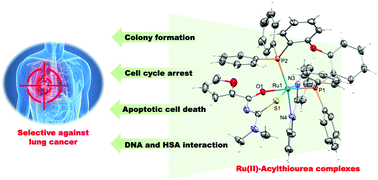We have synthesized and characterized three new ruthenium(II) diphosphine complexes containing an acylthiourea ligand, with the general formula [Ru(DPEPhos)(O,S)(bipy)]PF6, where DPEPhos = bis(2-(diphenylphosphino)phenyl)ether, bipy = 2,2′-bipyridine, and O,S = N,N-dimethyl-N′-(benzoyl)thiourea (1), N,N-dimethyl-N′-(furoyl)thiourea (2), and N,N-dimethyl-N′-(thiophenyl)thiourea (3), by several physicochemical techniques. We evaluated the ruthenium complexes for their cytotoxicity against two human cancer cell lines, A549 (lung) and MDA-MB-231 (breast), and two corresponding lines of non-cancer cells, MRC-5 (lung) and MCF-10A (breast). All the complexes are cytotoxic against the cancer cell lines; the IC50 values lie in the micromolar range (0.07–0.70 μM). Ruthenium complex 1 is more selective (7 times more active) toward lung cancer cells (A549) than toward non-cancer cells (MRC-5) and is 160 times more cytotoxic than cisplatin against A549 cells. Investigations of the mechanism of action of complex 1 in A549 cells demonstrated that it inhibits colony formation and promotes cell cycle arrest in the G1 phase and apoptotic cell death. DNA binding studies revealed that complexes 1–3 interact with the biomolecule via minor grooves. These complexes also interact with human serum albumin (HSA) and have affinity for site I by hydrophobic forces. Therefore, this new class of ruthenium complexes can act as cytotoxic agents, mainly for lung cancer treatment.

